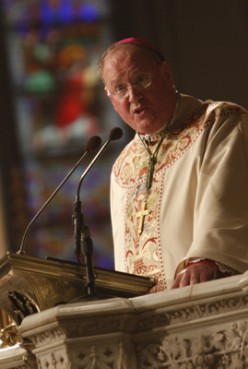
(RNS) Archbishop Timothy M. Dolan of New York, president of the U.S. Conference of Catholic Bishops, is increasingly at odds with the Obama administration over several policies. Religion News Service file photo by Gregory A. Shemitz.
(RNS) U.S. Catholic bishops, concerned about Obama administration policies on birth control and gay rights that they say see as an unprecedented “assault” on the rights of faith groups, have established a watchdog panel to combat threats to “religious freedom.”
The new Ad Hoc Committee for Religious Liberty was launched by the U.S. Conference of Catholic Bishops and unveiled by the USCCB’s president, Archbishop Timothy Dolan of New York, on Friday (Sept. 30).
The establishment of a committee — which signals a top priority for the hierarchy — represents another escalation in the Catholic bishops’ increasingly tense and public battle with President Obama as the 2012 presidential campaign season gets underway.
Citing the famous preamble to the Declaration of Independence, Dolan wrote that the rights of “life, liberty, and the pursuit of happiness” are now “increasingly and in unprecedented ways under assault in America” because of administration policies.
Bishop William Lori of Bridgeport, Conn., will chair the new committee, which will include two full-time staffers, a lawyer with expertise in religious freedom, and a lobbyist “who will handle both religious liberty and marriage issues,” the USCCB said.
Lori, who like Dolan lost a bid to stop legalized gay marriage in his state, said the committee aims to protect “the rights of believers of any religious persuasion or none.”
In his letter to all U.S. bishops, Dolan lists six recent developments that have prompted the hierarchy’s concern, several of which have been staples of the hierarchy’s growing criticism of the administration.
They include proposed regulations that require private health insurers to cover contraceptives, as well as efforts to force religious aid groups who accept federal money to include condoms in their HIV prevention campaigns.
The bishops and even some of the administration’s Catholic allies on health care reform say the religious conscience exemptions in the proposals from the Department of Health and Human Services are not broad enough.
Dolan also cites the administration’s challenge to the “ministerial exception” rule, which will be argued Wednesday (Oct. 5) at the U.S. Supreme Court, which could determine whether churches have to conform to employment discrimination laws for workers who are not clergy.
Dolan also blasted the White House’s decision not to defend the Defense of Marriage Act (DOMA), which defines marriage as the union of one man and one woman.
“Never before have we faced this kind of challenge to our ability to engage in the public square as people of faith and as a service provider,” Dolan said. “If we do not act now, the consequence will be grave.”
There are signs, however, that the White House may not see much upside to engaging the bishops.
Dolan voiced frustration that neither he nor the previous USCCB president, Cardinal Francis George of Chicago, received responses to private letters sent to Obama. Dolan said that’s partly why he decided to take the feud public.
“I have offered to meet with the president to discuss these concerns and to impress upon him the dire nature of these actions by government,” Dolan told the bishops.
In an interview last spring, George, who knew Obama from Chicago and also met him after his 2008 election, said Obama was always open to conversations, except they never produced results for the bishops.
“He’s a very easy person to talk to,” George told Commonweal magazine. “He’s really an amiable man, until you get to a point of disagreement. And he’s still amiable; he truly does want to be inclusive, and it’s perplexing when that’s not possible.”




